| Srl | Item |
| 1 |
ID:
122972
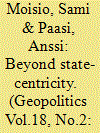

|
|
|
|
|
| Publication |
2013.
|
| Summary/Abstract |
This paper scrutinizes the challenges which scholars face when examining the interconnections between the state and geopolitics in the purported "transnational world". By discussing the relational perspective which "opens" the traditional state-as-a-monolith centric view of geopolitics, the paper sets a foundation for the present special section on the changing geopolitics of state spaces. The paper proceeds by first reflecting on the move from geopolitically "closed" to more open state territories, and then considers some of the ways the state has been examined in spatially sensitive research with respect to geopolitical scholarship. Finally, the paper maps out possible horizons for forthcoming studies on the geopolitics of state spaces.
|
|
|
|
|
|
|
|
|
|
|
|
|
|
|
|
| 2 |
ID:
074551
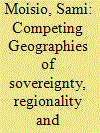

|
|
|
|
|
| Publication |
2006.
|
| Summary/Abstract |
European integration is often naturalised, so that the movement of a particular state towards integration, or away from it, is understood as being underpinned by eternal and everlasting national forces. The political struggles within the EU applicant states have not inspired scholars to produce sensitive studies of the "national debates" carried on in applicant states, even though this is exactly the field of political action where politico-geographical categories such as national identity, sovereignty and security come to be enthusiastically articulated. This paper both seeks to explain the struggle over Finland's decision to join the EU by focusing on the argumentation of those actors who "lost" the political struggle, and introduces the geographies that the opponents of Finnish EU membership produced. It is therefore aimed at illustrating the politics that underlay the geographical articulations which referred to either "national identity" or "sovereignty". The purpose of doing this is to trace the competing geographies involved in the Finnish EU struggle and to point out that they were indeed based on long historical traditions which competing political actors used as a source of legitimation in their political action. Most of the themes highlighted by the No-EU camp are prominent in contemporary EU debates, too.
|
|
|
|
|
|
|
|
|
|
|
|
|
|
|
|
| 3 |
ID:
123732
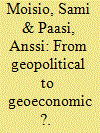

|
|
|
|
|
| Publication |
2013.
|
| Summary/Abstract |
This article underlines the significance of context-sensitive research in understanding the historical transformations of state space that have occurred as part of wider geopolitical conditions. We trace such transformations by theorizing the role of political rationalities in governance, and then by looking at how certain rationalities have surfaced in the spatial-political practices in Finland. We will scrutinise how the connection between space and population manifests in these rationalities. The paper traces at first the rise of the political rationality upon which the Finnish 'welfare state' was predicated, using the process as a touchstone to examine the recent political rationality which displays a will to transform the state and its spatiality. Our analysis reveals that an increasingly economistic and transnationally oriented geopolitical calculation of space is taking place in the ongoing governmental interventions aimed at modifying both the spatial structures and the qualities of populations in the name of national competitiveness.
|
|
|
|
|
|
|
|
|
|
|
|
|
|
|
|
| 4 |
ID:
101474
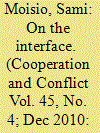

|
|
|
|
|
| Publication |
2010.
|
| Summary/Abstract |
Geopolitical writing has been more extensive in Finland than in any other Nordic country in recent years. This rejoinder article is a contextualized reading of the development of Finnish geopolitics within both Finnish Human Geography and International Relations academia. It seeks to diversify an argument propounded by Ola Tunander, who scrutinized recent developments in Nordic geopolitical scholarship. Tunander gave some interesting evidence of how a few critical scholars practising geopolitics were able to have a direct impact on political events in Europe in the 1990s and how they challenged the 'US victory school' characterized by realist geopolitics. This rejoinder article suggests that the rise of Finnish geopolitics in the 1990s had surprisingly little to do with its policy relevance to region-building or otherwise shaping the political landscape in the European North. The rise of Finnish geopolitics should rather be regarded as an academic process that was inspired by the advances made in Anglo-American critical political geography. While interdisciplinary geopolitical scholarship made a promising start in Finland in the 1990s, recent developments give less reason for optimism. Some challenges for future geopolitical scholarship are also discussed.
|
|
|
|
|
|
|
|
|
|
|
|
|
|
|
|
| 5 |
ID:
158357
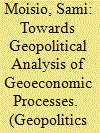

|
|
|
|
|
| Summary/Abstract |
In his article, Antto Vihma seeks to develop a geoeconomic approach that draws from Edward N. Luttwak’s conception of inter-state competition, and suggests that a more nuanced reading of Luttwak provides a way forward. In this essay, I first tease out and discuss Vihma’s arguments, before calling for the need to develop geopolitical analysis of contemporary geoeconomic processes. This kind of geopolitical analysis focuses on the political imaginaries that frame the world in terms of economic expansion, new kinds of inter-spatial competition, connectivity and pace or global integration and connectivity. These imaginaries have become increasingly salient in state-centric political debates on national interests, national security, and national identity.
|
|
|
|
|
|
|
|
|
|
|
|
|
|
|
|